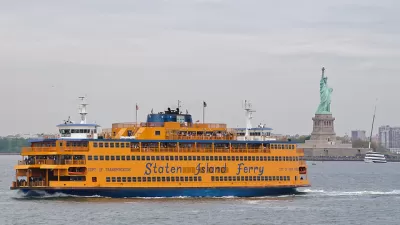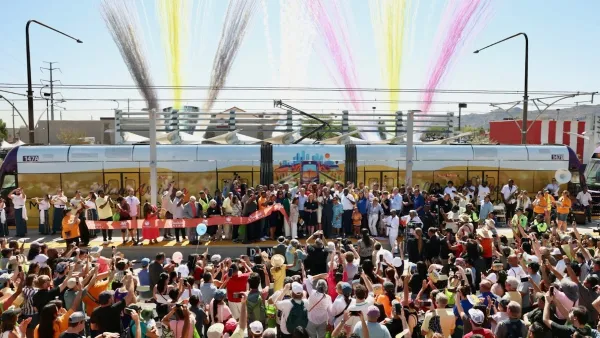A year-long study of the proposed West Shore Light Rail finds that the borough could draw nine stations and about 13,000 riders traveling within Staten Island or to Manhattan.
"Board member Vincent Accornero said the strong ridership forecast, particularly for the line's first four stations, make a good argument for developing the project at least that far.
A four-station line ending in Bloomfield would cost about $1.2 billion, while building the full nine-station length of the line to Richmond Valley, where it would meet the Staten Island Railway, would cost about $1.8 billion.
'Base' stations would be located at Elm Park, Richmond Avenue, Bloomfield near the Staten Island Corporate Park, Hugenot Avenue and Richmond Valley. Additional stations could be located at Forest Avenue, Victory Boulevard, Sharrotts Road and the Pleasant Plains Park and Ride near the Outerbridge Crossing."
FULL STORY: Staten Island light-rail line detailed

Planetizen Federal Action Tracker
A weekly monitor of how Trump’s orders and actions are impacting planners and planning in America.

Restaurant Patios Were a Pandemic Win — Why Were They so Hard to Keep?
Social distancing requirements and changes in travel patterns prompted cities to pilot new uses for street and sidewalk space. Then it got complicated.

Map: Where Senate Republicans Want to Sell Your Public Lands
For public land advocates, the Senate Republicans’ proposal to sell millions of acres of public land in the West is “the biggest fight of their careers.”

Maui's Vacation Rental Debate Turns Ugly
Verbal attacks, misinformation campaigns and fistfights plague a high-stakes debate to convert thousands of vacation rentals into long-term housing.

San Francisco Suspends Traffic Calming Amidst Record Deaths
Citing “a challenging fiscal landscape,” the city will cease the program on the heels of 42 traffic deaths, including 24 pedestrians.

California Homeless Arrests, Citations Spike After Ruling
An investigation reveals that anti-homeless actions increased up to 500% after Grants Pass v. Johnson — even in cities claiming no policy change.
Urban Design for Planners 1: Software Tools
This six-course series explores essential urban design concepts using open source software and equips planners with the tools they need to participate fully in the urban design process.
Planning for Universal Design
Learn the tools for implementing Universal Design in planning regulations.
Heyer Gruel & Associates PA
JM Goldson LLC
Custer County Colorado
City of Camden Redevelopment Agency
City of Astoria
Transportation Research & Education Center (TREC) at Portland State University
Camden Redevelopment Agency
City of Claremont
Municipality of Princeton (NJ)




























